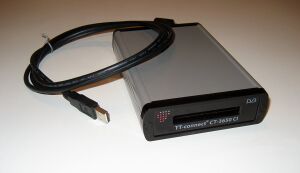DVB-C USB Devices
Jump to navigation
Jump to search
On this page you will find information regarding DVB-C USB devices.
Please be aware that:
- The information contained here is likely non-exhaustive and, despite best efforts to do otherwise, may contain errors. (Please help to keep these lists up-to-date so that they are useful for everyone!)
- If your device is not listed, try:
- searching the existing mailing list archives:
- searching for information with Google or other internet search engine
- by posting a question about the device directly to the LMML (but please do conduct a search first, as it may already have been discussed!)
- Note: when it comes to support, it is generally a good idea to try the current V4L-DVB sources because some device drivers can be very new and thus may have not made their way into the mainstream kernel.
- In any regard, in respect to the above listed suggestions, you may find it to be the case that your device is actually already supported or that experimental support is available.
- Because the component constitution on many devices are often similar or identical, there may be devices that are unlisted but may actually work with the existing driver framework for previously supported devices. In such a case, your non-listed but working device will likely be reported in your system messages as being one of those previously supported devices. If you encounter such an occurrence, please do report your success on the LMML so that proper detection/identification of your device can be added within the drivers.
- Lastly, it bears worth repeating the request: Please help to keep these lists up-to-date so that they are useful for everyone!
Supported DVB-C USB Devices
The following table lists the confirmed working DVB-C USB device and provides a brief summary of their features and components. If you need more technical information on a device, have a look at its specific wiki article.
If you are experiencing problems with USB devices, it may not be the fault of the tuner. For example AMD 700 series chipsets (e.g. 780G) have a problem with USB ports which results in tuners working or partially working or not working at all. This can be solved by using a separate USB adapter with a reliable chipset (e.g. VIA 6212L, NEC).
| Manufacturer Model |
Components | Connectors | Comments | Pictures
|
| Anysee E30C Plus |
|
Card reader |
|
|
| Anysee Anysee E30 Combo Plus |
Version 1
Version 2
|
Card reader - not tested |
|
|
| DVBWorld DW3101 |
|
NO Card reader | http://liplianin.at.tut.by/ds110en.html | [1] |
| PCTV QuatroStick nano (520e) |
|
NO Card reader |
|
[3] |
| Sundtek Sundtek MediaTV Pro |
|
|
|
|
| TechniSat CableStar USB / Cable4PC USB |
||||
| TechnoTrend PCLine DVB-C USB |
||||
| TechnoTrend TT-Connect C-1100 USB |
|
|
||
| TechnoTrend TT-Connect C-1200 USB |
|
|
||
| TechnoTrend TT-connect CT-3650 CI |
|
Common Interface (CI) - Tested successfully with kernel 3.2 and a Viaccess 4.0 DVB-T CAM. |
Currently Unsupported DVB-C USB Devices
If you own one or more devices from the following list and you want to help with support development, please contact the Linux-Media Mailing List (LMML). Note that if your device is similar to or contains components for which driver development is currently being undertaken, then it is possible that you will pique the developers' interest and can obtain some assistance that, possibly, leads to full support for your device.
However, please note that inquiries to the mailing list:
- Should NOT be treated as an order drop-off queue. You're soliciting help from volunteer developers who work on V4L-DVB matters in their spare time, and such work can be non-trivial (i.e. requiring even thousands of hours work). So being demanding is one sure route to being ignored. (Honestly, this point really shouldn't even need to be written, but you'd be surprised at the number of irrational individuals who write into the mailing list demanding this or that).
- May pass without garnering a response—a distinct byproduct of the fact that there are a limited number of developers, whom might be able to help, that are associated with the project. Often times, even if they wished to help, their energies are entirely tied up with other projects. In such cases, the best path might be to try to spearhead the driver development for your device yourself, or hire someone who can.
- Tongshi DVB-C USB [8] ... is this just a reference design?
- TechniSat CableStar Combo HD CI
